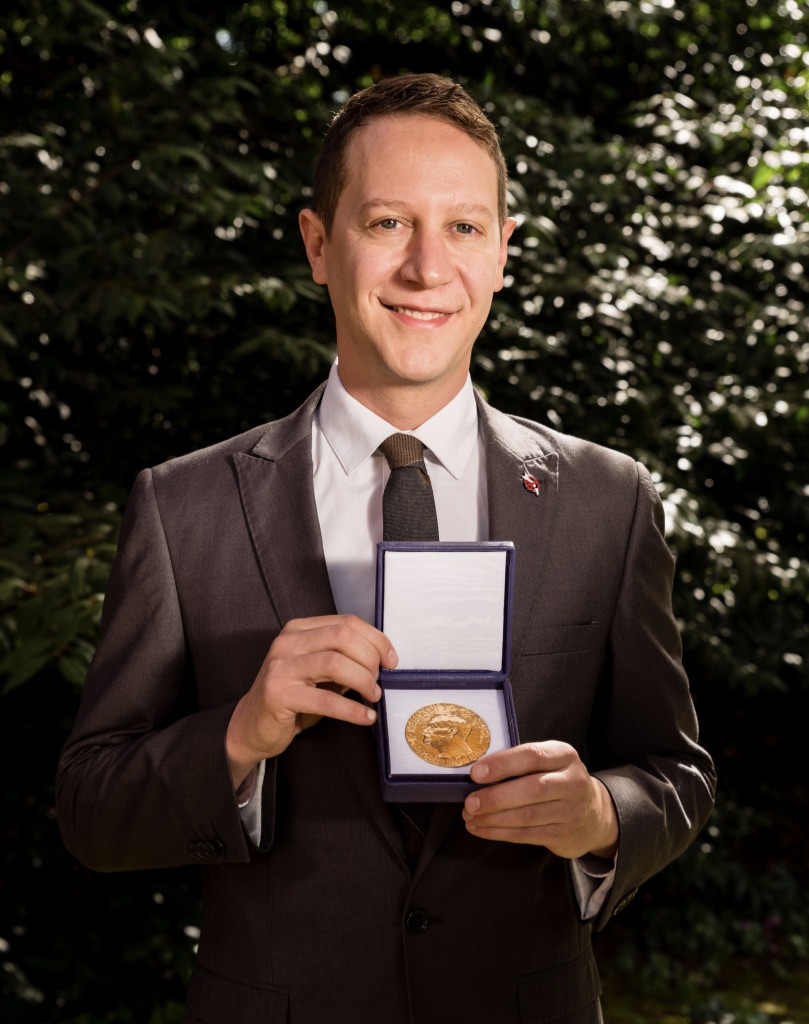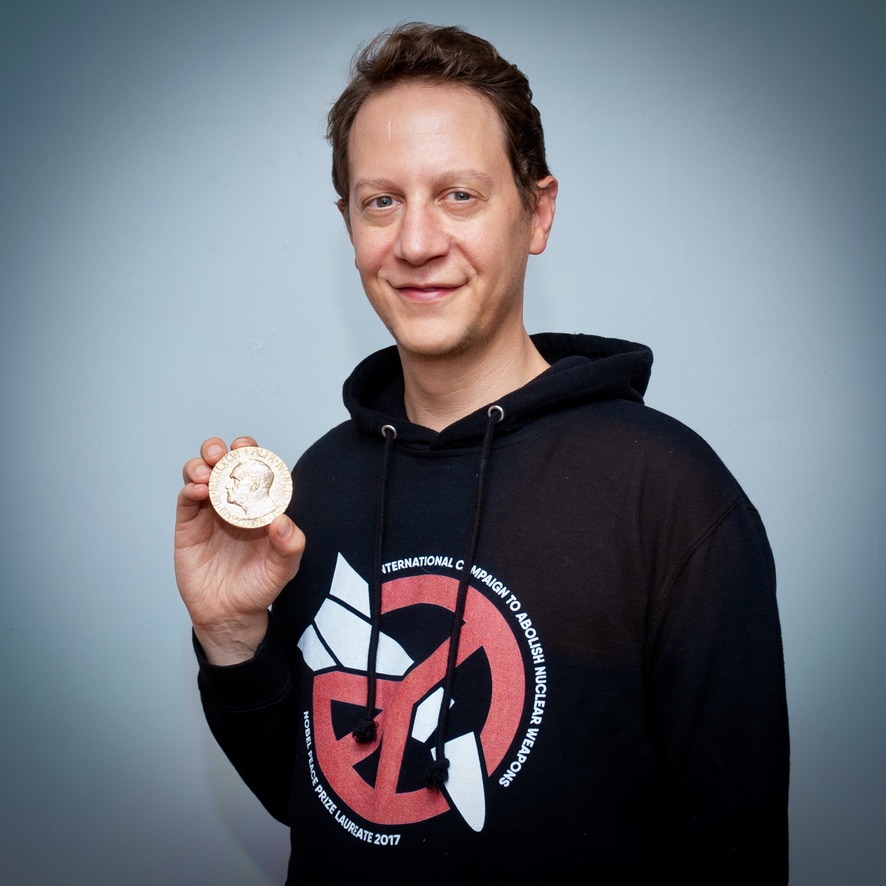From Stuyvesant to Nobel Peace Prize: A Conversation with Seth Shelden, JD ’94
July 7, 2017 – a day Seth Shelden ’94 calls “one of the most thrilling days of my life” – when 122 U.N. member states voted to adopt the Treaty on the Prohibition of Nuclear Weapons. Later that year, Seth and his International Campaign to Abolish Nuclear Weapons (ICAN) teammates headed to Norway for ICAN to receive the Nobel Peace Prize, which they won for their work in making that treaty a reality.
In a recent interview with SHSAA, Seth, who has since played a pivotal role in nuclear disarmament efforts, reflected on his early influences, his work with the United Nations, and how his high school years shaped his pursuit of a life dedicated to global peace and personal expression. Seth shared his thoughts on the importance of alumni networks as well. He admitted that he’d been urged by classmates and family to be more vocal about supporting initiatives at Stuyvesant, which he credits with providing him with the independence to pursue a variety of interests. Seth’s engagement in global affairs began long before his formal involvement with the United Nations, a path that seemed almost destined after his college years.
Seth recalled his early interest in nuclear disarmament, which can be traced back to his reading of Hiroshima by John Hersey. “That book really changed the way I thought about nuclear weapons,” Seth explained. “It shifted the issue from a theoretical discussion into something deeply personal and urgent.” He described his experience teaching law in Japan as pivotal, as it coincided with the United Nations’ efforts to begin discussions on a treaty to make nuclear weapons illegal. This treaty, formally known as the Treaty on the Prohibition of Nuclear Weapons, was adopted in 2017 and marked a historic achievement for global peace.

In 2017, Seth joined a group of activists at the UN, working tirelessly to help negotiate the treaty. “It was a year of intense sessions, and the treaty was eventually adopted by 122 countries,” he reflected. “Then, in 2020, it officially entered into force, marking a monumental step toward disarming nuclear weapons globally.” He proudly mentioned that his efforts in advocating for this treaty as General Counsel and UN Liaison earned ICAN a Nobel Peace Prize, which he keeps in his office as a reminder of the long road to progress.
Throughout our conversation, Seth underscored the importance of his background in law and international diplomacy, alongside his passion for the arts. “My family was heavily involved in music, so the arts were a natural fit for me,” he shared. From an early age, Seth’s exposure to the arts was integral to his upbringing. His mother, an English teacher at Stuyvesant, and his father, a renowned woodwind artist, created a home where music and creativity flourished. Seth pursued his own artistic endeavors, including starring as Harpo Marx in an off-Broadway revival of the Marx Brothers’ first Broadway show. “It’s a random but deeply fulfilling part of my life,” Seth laughed, referring to his ongoing involvement in the theater, including an upcoming film project.
However, Seth’s diverse interests—law, activism, and the arts—are not unrelated. “In a way, the arts taught me how to approach life creatively, and law and diplomacy showed me how to turn those ideas into action,” he explained. His commitment to global peace and justice mirrors the dynamic nature of theater itself, where every performance is an act of persuasion and influence.

When asked about his time at Stuyvesant, Seth spoke fondly of how it helped cultivate his intellectual curiosity. “Stuyvesant introduced me to a whole new world,” he said. As a student, he was drawn to subjects like European history, taught by the legendary Dr. Nikol, whose dynamic teaching style ignited Seth’s passion for world affairs. The school also fostered Seth’s love for Russian literature, an interest that continued to shape his academic and professional life. “It wasn’t just about the subjects. It was about how these subjects made me think about the world in a deeper, more interconnected way.” Seth acknowledged that his experiences at Stuyvesant gave him a unique perspective. “It wasn’t just the rigorous academics – it was the diversity and the people from all walks of life that shaped how I think today.” Moving to North Carolina for college, away from his Brooklyn roots, further expanded his view of the world. “It was the best decision I ever made,” he reflected. “The experience opened my mind to things I never would have encountered otherwise. Stuyvesant set me up to be curious and open-minded in ways that I didn’t even fully appreciate at the time.”
For Seth, the greatest lesson from Stuyvesant was not just about academic excellence but also about self-direction. “At Stuyvesant, you learn how to take initiative. You’re encouraged to think outside the box, and even challenge the system if necessary,” he explained. This spirit of independence served him well as he navigated the complex world of international diplomacy, often dealing with governments and diplomats in high-stakes negotiations. Seth also reflected on how his background at Stuyvesant helped him navigate the politics of organizations like the United Nations. “It’s about relationships,” he said. “Diplomacy is about reaching people, connecting with them, and persuading them to take action. Stuyvesant taught me how to do that, how to be resourceful, and how to push forward even when things seem impossible.”
The conversation turned to how Seth balances his many passions. “It’s a juggle, no question,” he admitted, especially considering his commitments in both law and the arts. “My theater company still has reading series, and I try to stay connected to the arts, even as I focus on disarmament.” The intersection of these diverse fields, Seth concluded, enriches his work and life, allowing him to bring fresh ideas and creativity into the often rigid world of diplomacy. In closing, Seth offered some advice for current students. “It’s not just about following a prescribed path. Follow what excites you, what makes you think differently. Don’t just go through the motions – whether in school, in your career, or in life.” It’s a message rooted in his own journey from Stuyvesant to international acclaim – a testament to the transformative power of curiosity, creativity, and persistence.
